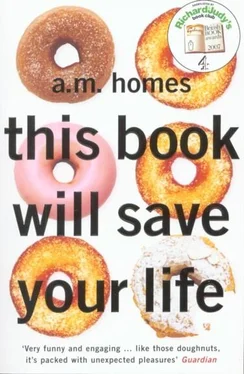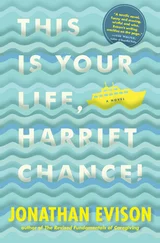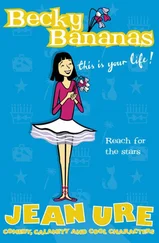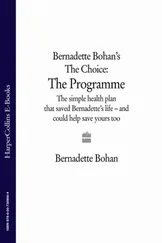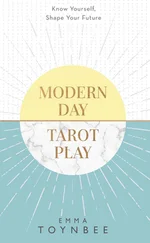"Nice to see you," he says, while they are waiting for the elevator.
She smiles. "How's Ben?"
"He's good, really good."
In the elevator going down, a disembodied voice speaks to them: "Can you hear me? This is a test, we are testing our system. Can you hear me?"
"Yes," they say in unison.
"Can you say a few words so we can be sure we hear you?"
"We are riding in the elevator," Richard says. "We are going down. Where are you talking to us from?"
"This is a satellite transmission from Burbank. Thank you for taking the time to assist us. This completes our test."
"LOOKS LIKE they found you very appealing," Dr. Anderson says, taking a look at her leg. "Any idea what kind they were?"
"Pointy ears, sharp faces, the kind that are in those ads for Mexican food."
"Chihuahuas?"
She nods.
"Sure it wasn't the saber-tooth?" the doctor asks, half kidding.
"Do you have saber-tooths on Rodeo Drive?"
"We've got everything," the doctor says.
"It was dogs," she says, "little dogs."
"Are you up to date on tetanus?"
"I'm up to date on nothing," she says.
"Have you seen this kind of thing before?" Richard asks the doctor.
"Can't say I've seen it, but I have heard about them, packs of untamed dogs. Have you ever had a rabies shot?" he asks the ex-wife.
"A shot in the stomach; isn't that what rabies is?"
"Actually, now it's in the arm."
"I wouldn't have thought it was something you kept in the office."
"I keep one of everything; I like to be prepared for all eventualities," he says. "Do you have any allergies, sensitivities — eggs, shellfish, nuts?"
She shakes her head. "Once some makeup remover gave me a rash, but that was years ago."
"OK, so we're going to give you two shots today, tetanus and a rabies, and then you'll have to have five more rabies shots over the next four weeks. It's very important that you get the full series of shots; rabies is fatal, but the shots are not."
Richard is looking at her — the planes of her face, the texture of her skin, the way she wears the passage of time — it all looks softer, warmer than he remembers.
"By the way, we found your EKG," the doctor says to him. "It was in a pile on Lusardi's desk." He steps out of the room to prepare the vaccines.
"I want to leave," she says, suddenly. "I don't like shots."
"It's not an option," Richard says. "I don't care."
"We need to stay," he says, taking her hand, squeezing.
"Since when are you like this?"
"Like what?"
"So kind?"
"I don't know," he says. And then, to fill the silence, he says, "Did you know I had polio?" — as though this is a good change of subject — but it's on his mind.
"You didn't have polio."
"I did, only I never knew. Why would you say I didn't?"
"Because you didn't. You weren't in an iron lung and you aren't in a wheelchair."
"There are a variety of forms."
The doctor comes back into the room. "We had a little bit of an earthquake this morning — did you feel it?"
"I felt nothing," Richard says.
He gives her the shots. "I'll have you sit in the waiting room for about twenty minutes, just to be sure there's no allergic reaction, and then you'll need the second shot in, say, three days. Your regular doctors can get it for you, but if you're still here, give a call and I'll do it."
"Thank you," she says. "Thank you very much."
"A pleasure to meet you."
Richard helps her off the table and into the waiting area.
"My plane was late getting in," she says. "We lost an engine over Ohio and had to go all the way back to JFK to get a new one."
Richard remembers the last time they made love; he did it knowing he was leaving, he kissed her cheek, her neck, her hair knowing it was the last time. "What were you thinking when we got married?" he asks her.
"I had high hopes."
"Do you remember what happened on our honeymoon?"
"The volcano erupted and we had to leave; there was ash, molten lava," she says; it was a game they used to play, always retelling the story of their relationship.
"The first time in more than a hundred and fifty years — we got out just in time — we went to Paris," he says.
She is quiet for a while. "What are you drinking?" he asks, assuming she will say something about him, something about Ben.
"I've been crazed," she says. "There's someone at the office who just does nothing; everyone else works like a dog, and this one guy does nothing, and I haven't had the nerve to say anything."
Like a kick in the stomach — same as it always was — it confirms what he felt long ago, what he knew. "Do you ever stop?"
"Why would I want to?"
"Do you love it — is it satisfying?"
"I don't have time to think about it."
"Is that why you do it, so you don't have to think?"
She doesn't answer.
"Do you?"
"I like to be active."
In the waiting room, the television is tuned to a local news station. "An Orange County mother is a hero. In a grocery-store parking lot, her car rolled on top of her toddler, pinning the child's arm. Maria Santiago lifted the car, and the child was able to crawl out with only a broken arm — the incident was caught on the store's external surveillance camera. 'What were you thinking when the car ran over your daughter's arm?' 'I just knew I had to get my baby out. I prayed to God to give me strength.' "
Richard changes the subject. "The other day, I saw a squirrel that had just been hit by a car; it wasn't dead, it was lying there, kicking frantically."
"Did you roll over it?"
"What do you mean?"
"Did you drive your car over it and put it out of its misery?"
"No; why?"
"Well, wouldn't you want someone to do that to you if you were on the side of the road — to put you out of your misery?"
"No," he says, horrified; it would never occur to him. "No," he says again, making it perfectly clear. "Talk to me, hold my hand, but don't run me over."
The doctor returns, checks her blood pressure, pronounces her good to go. "Take Tylenol, keep it elevated, and if you run a temperature above a hundred and two, call me."
Promptly at six, Ben arrives. He sees the ice pack, the gauze bandage around his mother's leg. "What happened?"
"Feral Chihuahuas," she says.
"Are you all right?"
"I'm fine," she says. "All cleaned up, vaccinated."
"You're sure you're OK?" he asks again.
"Yes," she says. "And you? How's the job?"
"Uh, let's just say I'm not going to be the next superagent."
"Everything is an experience," Richard says.
The three have not been in a room together since Ben's Bar Mitzvah, and then they were with a hundred other people. Richard half wishes someone would appear, a facilitator or someone who could fix it so it all made sense.
They are there — each entirely separate — like characters on a stage, blocked for dramatic effect, the two men standing, the woman seated on the sofa — with everything between them.
"So — what now?" Ben asks.
"My assistant made a reservation at Orso," she says.
"You're supposed to keep your leg up," Richard says.
"Well, there are three of us at a table for four; that's what the extra chair is for."
Ben keeps looking back and forth between them, moving his head, shifting.
"Are you looking for something in particular?" Richard asks Ben.
Ben leads them into the bedroom and has the three of them sit on the edge of the bed facing a large mirror — Ben in the middle.
"Do you see it?" Ben asks.
"Not sure what I'm looking for," Richard says.
"The mattress is hard," she says. "It must be new."
"My face," Ben says. "Look at my face. The hairline is yours," he says to his father. "And my eyes, my eyes are exactly the same as yours," he says to his mother. "And my chin…"
Читать дальше
